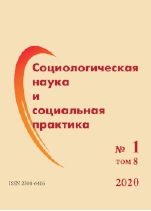Счастье и социальное благополучие в оценках россиян: проблема разграничения понятий
Аннотация
Литература
Батурин, Н. А., Башкатов, С. А., Гафарова, Н. В. Теоретическая модель личностного благополучия // Вестник ЮУрГУ. Серия «Психология». 2013. Т. 6. № 4. С. 4–14.
Воронин, Г. Л. Объективные и субъективные показатели общественного благополучия // Социологический журнал. 2009. № 3. С. 41–54.
Градосельская, Г. В. Субъективные и объективные оценки благосостояния // Социологический журнал. 2003. № 3. С. 86–98.
Дивисенко, К. С. Субъективное благополучие: возможности биографического исследования // Петербургская социология сегодня. 2018. Вып. 9. С. 47–61.
Карабчук, Т. С., Сальникова, Д. В. Объективное и субъективное благополучие: опыт сравнительного анализа стран Центральной Азии, России и Беларуси // Социологические исследования. 2016. № 5. С. 96–109.
Козырева, П. М. Карьера и благополучие в России: особенности и структура взаимосвязи // Россия реформирующаяся: Ежегодник-2011 / Отв. ред. акад. РАН М. К. Горшков. Вып. 10. М.; СПб.: Институт социологии РАН, Нестор-История, 2011. С. 44–60.
Коленникова, Н. Д. Экономический статус занятого населения России: объективное и субъективное измерения // Вестник Института социологии. 2018. Т. 9. № 1 (24). C. 76–94. DOI: 10.19181/vis.2018.24.1.498.
Мареева, С. В. Зоны субъективного благополучия и неблагополучия в российском обществе // Вестник Российского университета дружбы народов. Серия: Социология. 2018. Т. 18. № 4. С. 695–707. DOI: 10.22363/2313-2272-2018-18-4-695-707
Модель доходной стратификации российского общества: динамика, факторы, межстрановые сравнения / В. А. Аникин [и др.]; под редакцией Н. Е. Тихоновой. М.; СПб.: НесторИстория, 2018. 368 с. DOI: 10.317544469-1419-7.
Особенности модернизации социальной структуры российского общества: [монография]. [Электронный ресурс] / З. Т. Голенкова [и др.]. – Электрон. текст. дан (объем 2,32 Мб). М.: ФНИСЦ РАН, 2018. 200 с. DOI: 10.19181/monograph.2019.1. // Официальный портал ФНИСЦ РАН: [сайт]. URL: http://www.isras.ru/index.php?page_id=1198&id=6805 (дата обращения: 15.11.2019).
Радаев, В. В., Шкаратан, О. И. Социальная стратификация. М. Аспект Пресс, 1996. 318 с.
Сальникова, Д. В. Источники несогласованности результатов исследований взаимосвязи объективного и субъективного благополучия // Экономическая социология. 2017. Т. 18. № 4. С. 157–174.
Тихонова, Н. Е. Феномен социальной эксклюзии в условиях России // Мир России. 2003. Т. XII. № 1. С. 36–84.
Тихонова, Н. Е. Социальная структура России: теории и реальность. М.: Новый хронограф: Ин-т социологии РАН, 2014. 408 с.
Тихонова, Н. Е. Динамика социально-экономического положения массовых слоёв населения России: 2003–2018 гг. // Социологическая наука и социальная практика. 2018. Т. 6. № 3. С. 7–25. DOI: https://doi.org/10.19181/snsp.2018.6.3.6000
Черныш, М. Ф. Факторы, влияющие на переживание счастья в российском обществе // Социологическая наука и социальная практика. 2019. Т. 7 № 2. С. 9–33. DOI: https://doi. org/10.19181/snsp.2019.7.2.6407.
Шкаратан, О. И., Ястребов Г. А. Российское неоэтакратическое общество и его стратификация // Социологические исследования. 2008. № 11. С. 40–50.
Festinger, L. A Theory of Social Comparison Processes // Human Relations. 1954. Vol. 7. № 2. P. 117–140.
Graham, C. Subjective Well-being in Economics // The Oxford Handbook of Well-being and Public Policy / eds. M. Adler, M. Fleurbaey, NY: Oxford University Press, 2016. P. 424–452. DOI: 10.1093/oxfordhb/9780199325818.013.14.
Graham, C., Pettinato, S. Frustrated Achievers: Winners, Losers and Subjective Well-Being in New Market Economies // Journal of Development Studies. 2002. Vol. 38. № 4. P. 100–140.
Inequality in the 21st Century. Ed. by Grusky, D. B., Hill, J. London, NY: Routledge Taylor & Francis Group, 2018. 506 p.
Поступила: 24.11.2019
Опубликована: 01.04.2020








 Издатель: Федеральное государственное бюджетное учреждение науки
Издатель: Федеральное государственное бюджетное учреждение науки